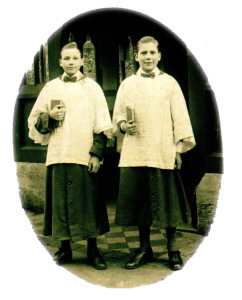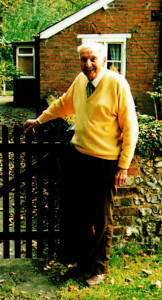
Walking around the village of Wendover, Buckinghamshire, with my father, now 88, is a joy.
He spent many of his childhood years here and, judging by the crystal clarity with which he remembers even small incidents, and the fits of giggles that occur before he can begin to tell a story, it was a very happy childhood indeed!
The cottage where he lived with his parents and three brothers is still there. According to my father it looks much the same from the outside (with the exception of the satellite dish!), although the well in the front garden has no
w been filled in and grown over. Water was pumped up from this well and into the kitchen. Very modern!
A simple two-up, two-down, the cottage stands by a stream, on the other side of which, reached by a footbridge over a litde weir, was the plot where my father’s family grew all their vegetables. Hazelnut trees grew along the banks of the stream to the left of the cottage, and a pair of kingfishers raised their yearly brood to the right.
Passing the church where my father and his brothers took turns to pump the organ and were, amazingly enough, choirboys, brings on the giggles again. He recal
ls the time when a marble, rolled along the choir stalls from one brother to another, ran off the end when someone failed to catch it. It bounced sedately down the chancel steps and, in full view of the congregation, disappeared down a grating.
Walking down the path towards the village, we reach what used to be the school. It has now been turned into a private house, but as with the cottage, the building still looks much the same from the outside. Because of an administrative error, my father didn’t actually start school until he was seven! It’s a great testament to his intelligence, and also to the old teaching methods, that despite this he passed his exam to go to Avlesbury Grammar School at the age of 11.

On one of the roads outside the village is a row of homes that used to be referred to as ‘the 30 cottages’. Disaster struck one day when a fire started in one of them, and because there were no proper roof divisions spread through all 30, causing enormous damage. The fire brigade had been called, but it took so long to round up the horses from the field and harness them to the engine that the fire was burning furiously by the time they got there!
Like most of the children in the village, my father would spend the long summer holiday in the local farmer’s fields, helping with the harvest. Several weeks of very hard work later would be rewarded by the princely sum of ten shillings! My father still remembers with obvious appreciation the lunches they were given of home-made bread and cheese, washed down with flasks of cold tea. The only drawback to the whole thing were the harvest bugs, which became trapped under the trouser waistband and caused great irritation.
If anyone thinks the children of yesteryear were little angels compared with now, think again! My father recalls two brothers, friends of his in the village, who were always up to something. One day they took it into their heads to make a cannon! They found a metal tube, mounted it on a wooden base with wheels and mixed up a home-made gunpowder. For ammunition they used some of the many lumps of chalk to be found in the fields, then aimed at a wall at the back of their house. The game eventually came to an end when the whole thing exploded! The fact that no-one was injured can only have been through luck rather than judgement.
From swimming in the stream to falling out of trees, from Ratting Sundays (thereby hangs a tale!) to sharing the tin bath with neighbours’ children, I could go on… I could write a book – and one day I might dojust that!
Hilary A. Austen








